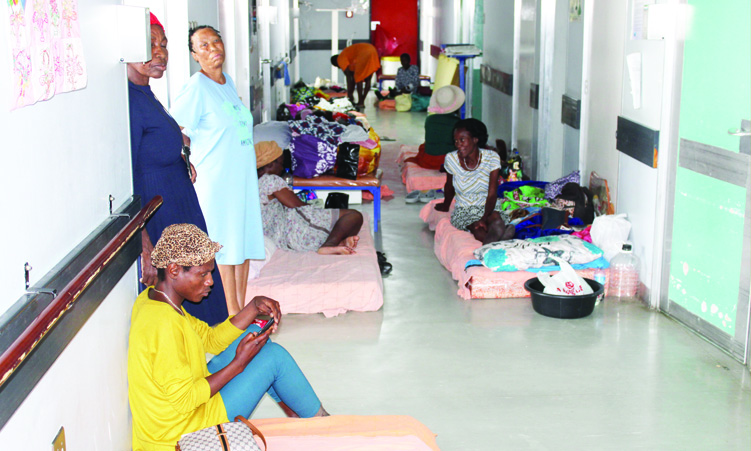Several patients at the Windhoek Central Hospital have been forced to sleep on the floor of the hospital’s corridors.
This was revealed yesterday by the parliamentary standing committee on gender equality, social development and family affairs, which undertook an inspection visit to the hospital.
“I am thankful for the nurses and doctors who constantly take care of us, but it is a nightmare when one has to be transferred to the ground, sleeping in the corridors, on the floor and on that thin mattress,” one of the patients, Liami Shikongo, yesterday told The Namibian.
She said this could worsen her illness.
“I don’t know whether it is an issue of space or a lack of beds, but we need the government to intervene in constructing a new hospital or renovating the hospital,” she said.
According to another patient, who prefers to remain anonymous, patients not only sleep on the floor, but are also served undercooked food.
“We are tired, they serve horrible food. Their chicken is undercooked and their food is tasteless,” she said.
Several patients complained of the same issues.
Marlyn Kharis-Oas, a senior registered nurse and ward matron, said wards are supposed to be occupied by four patients only, but currently accommodate up to six each.
“The rest of the patients are on the floor. The nurses and doctors are doing their part, but the situation is out of hand.
“We need a second district hospital, because we are not functioning, and what you see today is an everyday practice, but especially on Wednesdays and Thursdays.”
Kharis-Oas said nurses treat patients on the floor, with no privacy.
“Another issue we are also struggling with is the machinery that is always breaking. This is why patients are housed for a longer time, but if the machines were operational the patients would be treated and leave, which would decrease the overflow,” she said.
The parliamentary committee on gender equality, social development and family affairs’ chairperson, Godhart Kasuto, yesterday encouraged doctors and nurses to explain the situation to patients.
“Take the patients through the situation so that they will know what they are getting themselves into. That communication from the nurses and patients just as they are getting admitted is very important,” he said.
Executive director of health and social services Ben Nangombe was yesterday not reachable for comment, but has in the past said the country has a lack of space, not hospital beds, when commenting on a similar situation at Katutura Intermediate Hospital.
“The provision of mattresses gives better comfort for the new mothers as they would otherwise have to sit on chairs,” Nangombe explained.
More than 85% of the population depends on public healthcare, he said.
Nangombe said space constraints would be effectively dealt with through the construction of new health facilities or the expansion of existing ones, such as new projects completed at the Windhoek Central and Katutura Hospital complexes.
“These include the construction of new Covid-19 isolation facilities, which could be repurposed to cater for other categories of patients,” he said.
Stay informed with The Namibian – your source for credible journalism. Get in-depth reporting and opinions for
only N$85 a month. Invest in journalism, invest in democracy –
Subscribe Now!










